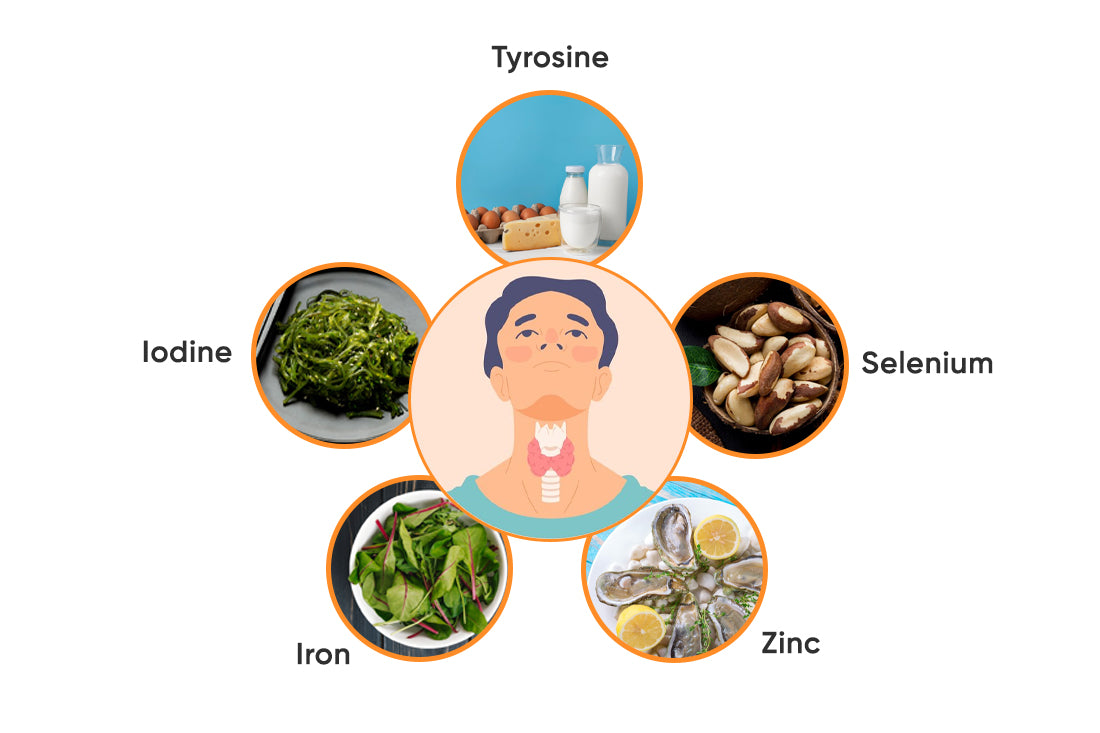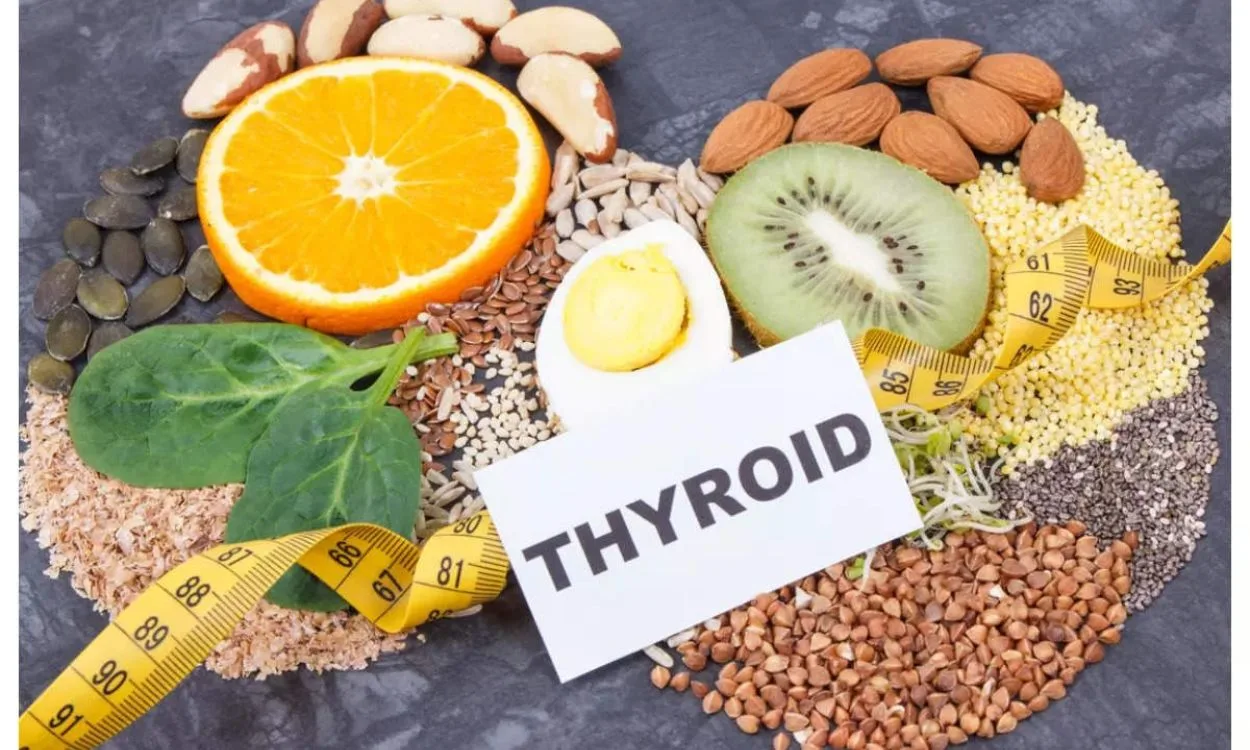
How Diet and Functional Medicine Can Restore Thyroid Health and Reduce Weight Gain

How Diet and Functional Medicine Can Restore Thyroid Health and Reduce Weight Gain
Thyroid imbalance, particularly hypothyroidism, is a common concern that affects millions of people worldwide. Beyond fatigue, brain fog, and low energy, thyroid dysfunction can also lead to weight gain, making everyday life more challenging. Many patients struggle with diet and exercise, only to find that nothing works because the root cause, the thyroid, is not addressed.
This is where functional medicine comes in. Unlike conventional approaches that focus solely on medication, functional medicine looks at why the thyroid isn’t working properly and supports the body in healing naturally. Combined with a nutrient-rich diet, this approach can help restore metabolism, balance hormones, and promote healthy weight management.
Understanding the Thyroid and Its Role in Weight

The thyroid is a small gland located at the base of your neck, but its impact is huge. It produces T3 and T4 hormones, which regulate metabolism, energy production, and even body temperature. When the thyroid is underactive (hypothyroidism), hormone production decreases, slowing metabolism.
Why Thyroid Imbalance Causes Weight Gain
- Slower metabolism: Low thyroid hormone levels reduce the number of calories your body burns at rest.
- Fluid retention: Hormonal imbalance can lead to water weight and bloating.
- Fat accumulation: Imbalances affect how your body stores fat, particularly around the abdomen.
- Changes in appetite: Hormonal disruptions often increase cravings, especially for carbohydrates and sugar.
Weight gain from thyroid dysfunction is not simply about overeating, it’s about a metabolic slowdown and nutrient deficiencies that must be addressed to see lasting results.
The Role of Diet in Supporting Thyroid Function

A nutrient-rich diet is the foundation for thyroid health. Certain vitamins and minerals are essential for hormone production and optimal function. Here’s what you need to know:
1. Iodine: Essential for Hormone Production
Iodine is a key component of thyroid hormones T3 and T4. Without it, your thyroid cannot produce enough hormones, leading to hypothyroidism.
Sources: Iodized salt, seaweed, fish, dairy
Functional medicine approach: Testing ensures optimal iodine levels. Both deficiency and excess can be harmful, so personalized guidance is critical.
2. Selenium: Protecting and Activating the Thyroid
Selenium is necessary for converting T4 (inactive) into T3 (active) and protects the thyroid from oxidative stress.
Sources: Brazil nuts, fish, eggs
Functional medicine approach: Individualized supplementation prevents toxicity while ensuring the thyroid has enough support for optimal hormone conversion.
3. Zinc: Supporting Hormone Production and Immunity
Zinc contributes to thyroid hormone production and overall immune health.
Sources: Nuts, seeds, shellfish, whole grains
Functional medicine evaluates zinc status and absorption, as gut issues often affect zinc levels.
4. Iron: Key for Thyroid Enzyme Function
Iron is required for the thyroid peroxidase enzyme, which synthesizes hormones.
Sources: Red meat, lentils, spinach
Functional medicine can check iron levels and address absorption issues caused by gut inflammation or autoimmune conditions.
5. Vitamin D: Regulating Immunity and Reducing Inflammation
Vitamin D deficiency is linked to autoimmune thyroid conditions like Hashimoto’s. Adequate levels help reduce inflammation and support hormone balance.
Sources: Sunlight, fatty fish, fortified foods
Personalized testing and supplementation ensure proper dosage.
6. Vitamin B12: Supporting Energy and Metabolism
B12 is crucial for energy production, nerve function, and overall metabolism. Deficiency is common in thyroid patients, especially those with autoimmune conditions.
Sources: Meat, eggs, dairy
Functional medicine identifies absorption issues, which may be due to gut health problems.
7. Protein & Amino Acids: Building Blocks of Hormones
Tyrosine, an amino acid found in protein-rich foods, is essential for hormone synthesis.
Sources: Eggs, dairy, soy, poultry, nuts
Ensuring adequate protein intake helps maintain muscle mass and metabolism.
Anti-Inflammatory Diet for Thyroid and Weight Management

Functional medicine emphasizes reducing chronic inflammation, which can interfere with thyroid function and lead to weight gain. Anti-inflammatory foods include:
- Leafy greens (spinach, kale, Swiss chard)
- Berries (blueberries, strawberries, raspberries)
- Fatty fish (salmon, mackerel)
- Turmeric and ginger
- Olive oil and nuts
At the same time, it’s recommended to limit processed foods, refined sugar, and excessive alcohol, as these can worsen inflammation and hormonal imbalance.
Functional Medicine Approach to Thyroid Health

Functional medicine focuses on root causes and tailors treatment to each individual. Here’s how it works for thyroid health and weight management:
1. Comprehensive Testing
- Functional medicine evaluates:
- Thyroid hormones (T3, T4, TSH, Reverse T3)
- Thyroid antibodies (for autoimmune conditions)
- Nutrient levels (selenium, iodine, zinc, vitamin D, B12, iron)
- Hormones affecting metabolism (cortisol, insulin, sex hormones)
This detailed testing identifies deficiencies, imbalances, and underlying causes of weight gain.
2. Personalized Nutrition and Supplementation
- Unlike a one-size-fits-all approach, functional medicine creates a tailored plan to support your thyroid:
- Correcting nutrient deficiencies
- Choosing the right foods to support metabolism and hormone production
- Recommending supplements only when necessary
This ensures your thyroid functions optimally while avoiding unnecessary supplementation.
3. Gut Health Optimization
A healthy gut is essential for nutrient absorption and hormone regulation. Functional medicine addresses:
- Dysbiosis (imbalance of gut bacteria)
- Leaky gut syndrome
- Food sensitivities
By improving gut health, your body can absorb thyroid-supporting nutrients more effectively, boosting metabolism and aiding weight loss.
4. Lifestyle and Stress Management
Stress and poor sleep negatively impact thyroid function and metabolism. Functional medicine emphasizes:
- Stress reduction techniques (yoga, meditation, deep breathing)
- Regular, restorative sleep
- Physical activity tailored to your energy levels
Balancing cortisol and other stress hormones helps restore thyroid function and reduces weight gain.
5. Supporting Metabolism Safely
Functional medicine combines diet, supplementation, gut support, and lifestyle changes to restore metabolism naturally. This approach helps patients:
- Lose weight without extreme diets
- Improve energy levels
- Reduce inflammation
- Restore hormone balance
When metabolism is restored, weight management becomes much more achievable.
Practical Tips for Everyday Life
1. Eat balanced meals with protein, healthy fats, and fiber every 3–4 hours.
2. Include thyroid-supporting nutrients like iodine, selenium, zinc, and vitamin D.
3. Limit raw cruciferous vegetables if you have iodine deficiency, but don’t avoid them completely.
4. Reduce processed foods, refined sugar, and alcohol.
5. Stay hydrated to support digestion and metabolism.
6. Practice stress management daily and prioritize 7–8 hours of sleep.
Signs You Need Functional Medicine Support
- Persistent fatigue and low energy
- Unexplained weight gain or difficulty losing weight
- Hair thinning or hair loss
- Dry skin, brittle nails, or dull complexion
- Brain fog, irritability, or mood swings
- Feeling unusually cold or sensitive to temperature
If you recognize these signs, a functional medicine approach can help identify the root causes and provide personalized solutions.
Takeaway
Weight gain and thyroid imbalance are not just about eating less and exercising more. Functional medicine addresses the root causes, including nutrient deficiencies, gut health, hormonal imbalances, and lifestyle factors. When combined with a nutrient-rich diet, functional medicine can help restore thyroid function, boost metabolism, and support healthy weight management.
At Midas Wellness Hub, we offer comprehensive functional medicine consultations to help you reclaim your energy, manage your weight, and improve your overall well-being. With the right guidance, you can restore your thyroid health naturally and see lasting results in both energy and appearance.
